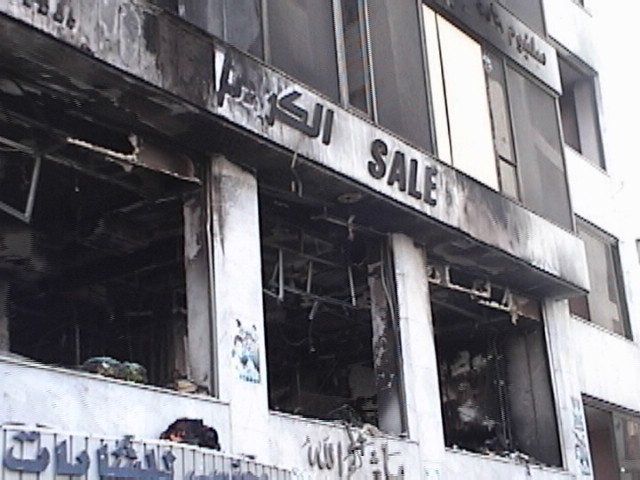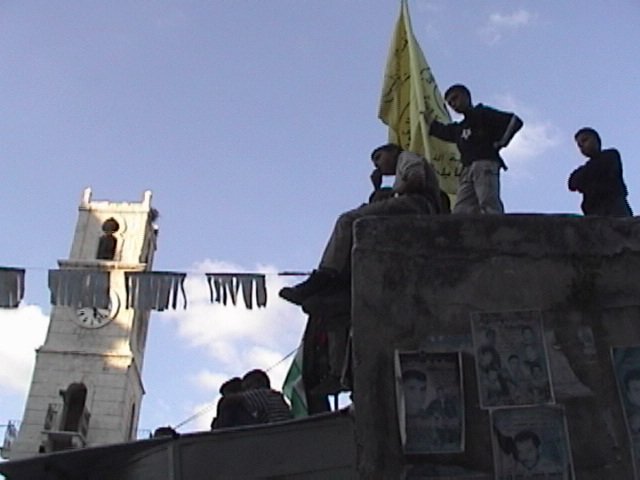October 4, 2002
Elizabeth's 30th birthday, spent relaxing, knitting, reading, websurfing, and talking to family. Rather than being distressed by no longer being a twentysomething, Elizabeth is suprisingly content to move into what she calls her second trimester of life. That feeling is buttressed by her completion this year of her (seemingly interminable) Master's degree. ilhamdulillah. And today she tucked another accomplishment under her belt: she finished knitting the sweater she's been working on for about 8 years (first envisaged as an Icelandic cardigan, then unraveled to be remade a free-style pullover). Now she plans to start a hat, hoping to finish it before she's 60.
Meanwhile, in Nablus, curfew is in place again today, but people are moving around a bit - being Friday, things'll be quieter anyway. In the morning, Marthame went to meet Fr. Hosam for "Sunday" School - the first meeting in months, too. Unfortunately, Marthame was an hour late - the time changed last night (falling back), but for some reason it takes everybody a few days to get on the same page about whether to meet on "summer time" or "winter time".
The two of them went over to the Melkite Convent in Rafidia to wait for a delivery of relief supplies from Caritas-Jerusalem. It gave Marthame a chance to reconnect with Fr. Joseph (Melkite), Fr. George (Orthodox), and Fr. Jalil (Roman Catholic - originally from Zababdeh, no less). Everyone is enjoying the collective "resistance" to curfew, something that has only emerged consistently in the last four or five days. We waited, drank coffee, waited some more, and drank some more coffee. Eventually, the call came that Caritas was turned back at the Huwara checkpoint and was going to make alternative delivery plans. Once again, the army's word is worth as much as the paper it's written on.
Marthame went off with a friend to have lunch and visit with his family (and their two adorable girls). The conversation focused on politics and history mostly, as do most conversations here. "You know when we'll have a Palestinian state?" he asked. "When we have a Ghandi." Perhaps so.
What was once the 15-story City Center mall.
An all-too-familiar scene in Nablus.
After lunch, the two of us headed down towards the Anglican Compound in Nablus, first taking a "death and destruction" driving tour of the city. The closer we got to the center of town, the thinner the traffic got, an indication of the presence of the military. Everywhere are the signs of battle - one is the burned-out hull of the City Center, a fifteen-story mall at the center of town. A few weeks back, there were army tanks parked in front, engaging in a fire fight with the local shabab (young men). The soldiers eventually turned and open fire on the empty City Center, engulfing it in flames and sending the security glass showering to the ground. It crunched under our feet like fresh snow as we walked.
As we pulled up to the Muqat'a, the old Palestinian Authority offices, we could see a tank pull away from a nearby intersection. The main road into Nablus, which runs right by the building, has been bulldozed and piled high with dirt - it wasn't long ago that such a sight was unusual to us. Now, it's so commonplace it's hardly worth mentioning. The building, which dates originally from the time of the British Mandate period, is in ruins - F-16s took care of that. The same is true of cars, fountains...
Next door stands what remains of the city jail. "See that number 7? That was my cell." The life-cycle of public buildings seems to be: Turkish, British, Jordanian, Israeli, Palestinian, rubble. Our friend had been arrested on twenty different occasions, doing his time as a political prisoner in the early 1980's, before the first Intifada. He's now a family man, but those early days of political and social activism clearly linger in his heart.
A political rally taking place in Nablus’ Old City.
We tried to make our way back to the Anglican church by passing through the Old City, but there was a rally taking place - more defiance in the heart of Occupation and house arrest. In the evening, those gathered in Nablus made an important phone call to Zababdeh (now seemingly across an international border) to wish Elizabeth a proper happy birthday - in both English and Arabic. It's another quiet night - perhaps the worst has passed and Marthame won't get to experience the hell people have been living here for the past four months.
Fr. Hosam sent a report to the Anglican Diocesan offices in Jerusalem, describing his ministries in a suffocating city.



